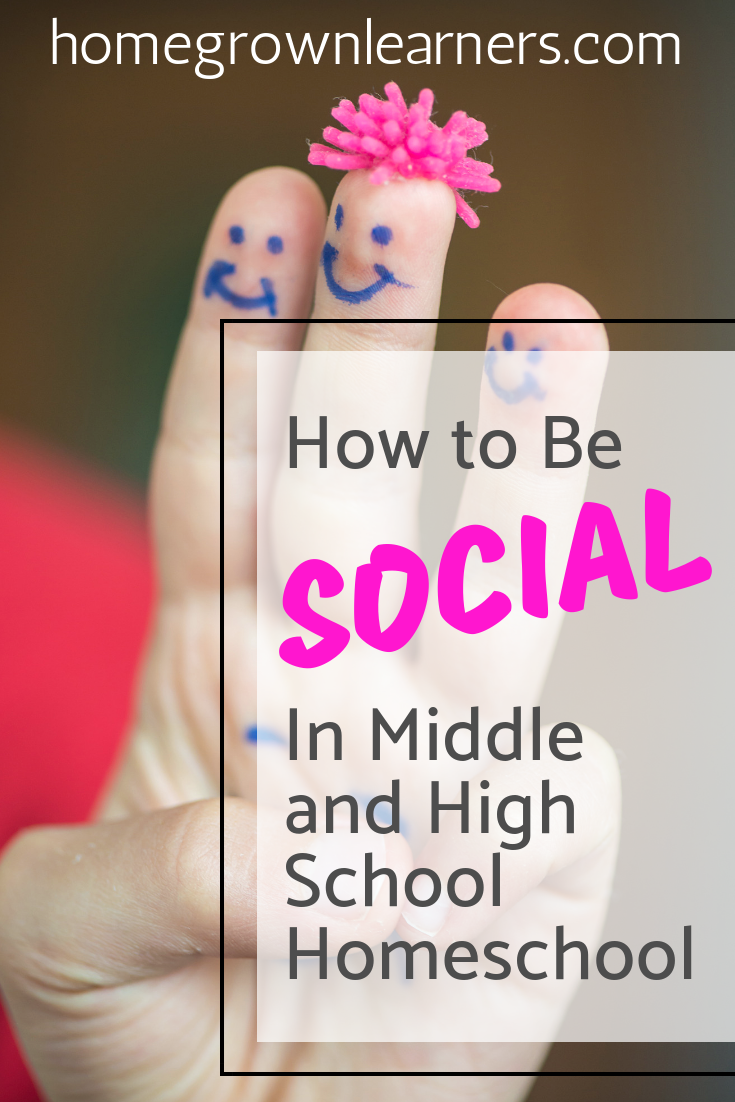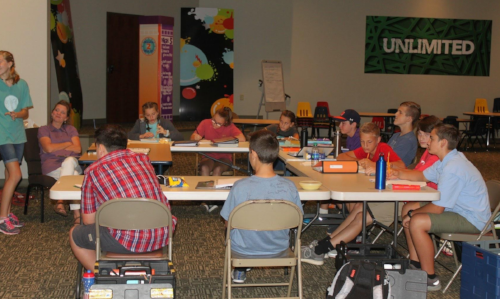Socialization is a common concern of parents of older homeschoolers. Many families make the decision to send their children to traditional school for this reason. A common myth is that our older kids simply “need” things that only a school environment can provide.
This is actually one of those times where I agree with the myth.
(Well, partly.)
I believe we can stay the course for homeschool in the middle and high school years. I also believe, however, that we need to provide our children with a broader range - and more “school-like” opportunities at this age.
As our children mature into the middle and high school years, we need to keep in mind the need they have for independence, belonging, and ownership.
Learning everything from mom and/or a textbook won’t cut it. Sports teams are increasingly difficult to find for older homeschoolers. Children need other voices of authority and accountability.
The teen years are a tricky transition time - at any age - but for homeschoolers there are many decisions and changes to be faced.
We must be intentional about the academic, physical, and peer opportunities we provide for our homeschoolers. It is an interesting situation, though, because as we step away so our children can assume more independence, we need to be MORE involved in and knowledgeable about their activities.
To put this in simple terms - homeschooling our teens requires more head space! Increasing independence doesn’t mean parents can step out… quite the opposite!
Academics Socialization in Upper Grades Homeschool
Do you recall a specific teacher that truly excited you about a subject?
I remember an English teacher in middle school who was passionate about language. Learning beautiful words was a priority in her class. The influence of Mrs. Willets, followed by my wonderful literature teacher, Mrs. O’Connor, the next year, created a love of reading and writing in my young mind.
Our homeschoolers need these types of experiences. How will they discover a passion unless it has been shared with them?
My daughter, Anna, discovered a love for science after having two great teachers in Chemistry and Anatomy & Physiology. - teachers at a local classical school she attends. I am CERTAIN if she wouldn’t have taken these classes she would never have discovered her interest in science.
We can still retain the “homeschool” atmosphere while giving our children varied academic voices. All of the following options are still “homeschool”, but they give kids the chance to hear from expert voices:
online classes (Mr D Math is a perfect example - he completely reversed my daughter’s feelings about math!)
local homeschool hybrid schools/co-ops
parent-taught classes by ANOTHER parent who has expertise in a certain area (maybe an IT dad who would teach a coding class, or an accountant mom who teaches a math class).
mentorship with a member of the community who is willing to take a child under their wing and teach them about a particular area
(I loved that my kids got to meet Mr. D in person - we highly recommend him for upper grades math!)
Most teens work harder for a “teacher” than they will for mom or dad.
And, having the experience of time pressures, grades, and serious accountability not only prepares our children for college (or whatever comes next) but it also provides them with a feeling of accomplishment and confidence when it is all said and done.
I have found mixing a variety of teacher, parent, and student-led coursework to be the perfect marriage in our homeschool. My daughter has a lovely mixture of online and in person coursework, self-study, mentorship, and parent-led instruction, too.
Physical Socialization in Upper Grades Homeschool
Many teens have a deep need and desire to take part in a sport and/or be part of a team. If this physical outlet isn’t met, all other things will suffer.
What is a parent to do, however, when their child reaches 8th grade and the opportunities for things like Little League and other rec sports dwindle?
A few ideas:
Do you live in a state where homeschoolers can play on public school teams? (Some states like Alabama have laws in place to provide for this.) Find out about these state laws at HSLDA.
Many private schools allow homeschoolers to play on their teams - my son plays basketball for a local Christian school.
Create your own opportunity. For example, my kids played on a homeschool USTA tennis team. A few moms worked with local tennis coaches to set up instruction times, and then registered a USTA team of homeschoolers.
Check the YMCA - our YMCA offers certain sports through high school and I have also seen special opportunities for homeschoolers, too.
Ask around, and if an opportunity doesn’t exist - create one yourself!
The physical outlets we provide for our kids are every bit as important as the academic outlets!
Peer Socialization in Upper Grades Homeschool
This can be THE MOST CHALLENGING part of homeschooling teens - friendships.
When our children are younger simple park dates and field trips are enough for socialization, but as our children mature they need deeper friendships with meaningful connections.
The world of traditional school encourages our children to cast their nets wide rather than deep — more is better, right?
More friends. More activities. More AP classes. More, more, more.
In the homeschool world we have the beautiful opportunity to encourage our children to go DEEP.
Cultivate a few lasting friendships. Hone in on one or two activities you enjoy. Study a few things that are of interest to you. Less is more. The gift of space is HUGE for our teens.
Keep this in mind as you think about socialization and your teen. We need to cast aside the notions of what “should” be for our kids, and give ourselves permission to let them be who they are, without the pressure of a school telling them what to do.
I would encourage you to do everything you can to steer your teen towards healthy social outlets - even creating them yourself - so that you can provide them with strong friendships and activities during their middle and high school years.
Examples:
activities with local homeschool groups (we have a few that put on dances during the school year - so much fun!)
participating in a local co-op or hybrid school where different families take turns hosting social events for the teens
choosing activities carefully where your children have good friends
making your home inviting and a gathering place, so your child can invite their friends over
carefully cultivating a homeschool circle of families - a group you will travel the entire educational journey with
I have been so pleased with the homeschool path we have taken with our children. My children are happy and safe. They have kind friends who support them. They aren’t concerned about superficial things like boyfriends and girlfriends, clothing, popularity, or social media. We have worked hard to craft a life that is meaningful and valuable for them - minus the junk our world has told them should naturally just be a part of being a teenager.
Let me encourage you to stay the homeschool course with your big kids.
It’s SO worth it.
Do you homeschool big kids?
What unique opportunities have they taken advantage of that you can share with us?
You Might Also Like:
High School Math with Mr. D
Homeschooling the Middle School Boy










